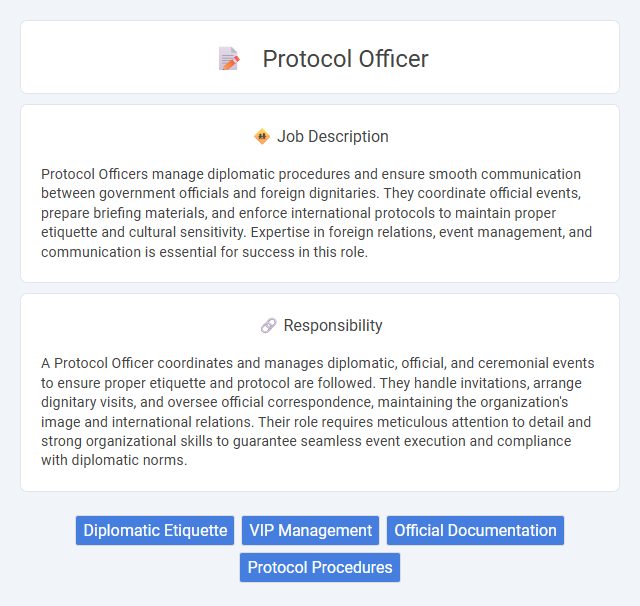
Protocol Officers manage diplomatic procedures and ensure smooth communication between government officials and foreign dignitaries. They coordinate official events, prepare briefing materials, and enforce international protocols to maintain proper etiquette and cultural sensitivity. Expertise in foreign relations, event management, and communication is essential for success in this role.
Individuals with strong interpersonal skills and a calm demeanor are likely to be suitable for a Protocol Officer role, as it often involves managing formal events and diplomatic interactions. Those who enjoy attention to detail and can handle high-pressure situations with professionalism may thrive in this position. However, people who struggle with multitasking or have difficulty maintaining discretion might find this job challenging.
Qualification
A Protocol Officer must possess strong interpersonal and communication skills, often supported by a degree in international relations, political science, or communications. Experience in diplomatic or corporate protocol settings is essential, emphasizing knowledge of etiquette, event coordination, and cross-cultural sensitivity. Proficiency in multiple languages and exceptional organizational abilities further enhance the effectiveness and qualifications of a Protocol Officer.
Responsibility
A Protocol Officer coordinates and manages diplomatic, official, and ceremonial events to ensure proper etiquette and protocol are followed. They handle invitations, arrange dignitary visits, and oversee official correspondence, maintaining the organization's image and international relations. Their role requires meticulous attention to detail and strong organizational skills to guarantee seamless event execution and compliance with diplomatic norms.
Benefit
A Protocol Officer likely enhances organizational reputation by ensuring smooth diplomatic interactions and compliance with formal procedures. This role probably offers professional growth opportunities through exposure to high-level events and diverse stakeholder engagement. Employees in this position tend to benefit from developing strong communication and cultural awareness skills, which may increase career prospects in international relations.
Challenge
A Protocol Officer likely faces significant challenges in navigating complex diplomatic environments and managing diverse cultural expectations to ensure seamless events and communications. The role probably requires balancing strict adherence to formal protocols with the flexibility to adapt to unexpected situations, demanding strong problem-solving skills and discretion. Managing high-pressure scenarios with precision is expected to be a critical aspect of maintaining professional relationships and organizational reputation.
Career Advancement
A Protocol Officer plays a crucial role in managing formal procedures, diplomatic interactions, and event coordination within government or multinational organizations, ensuring smooth communication and adherence to protocol standards. Career advancement opportunities often include progressing to senior protocol roles, such as Chief Protocol Officer or Diplomatic Advisor, where strategic planning and high-level negotiation skills are essential. Gaining expertise in international relations, intercultural communication, and event management enhances promotion potential and opens pathways to leadership positions in global institutions.
Key Terms
Diplomatic Etiquette
Protocol Officers ensure strict adherence to diplomatic etiquette, managing formal events and ceremonies with precision to uphold the dignity of international relations. Their expertise includes coordinating official visits, handling diplomatic correspondence, and advising on appropriate conduct to prevent protocol breaches. Mastery of cultural sensitivities and international customs is critical for maintaining seamless communication and fostering trust among global stakeholders.
VIP Management
Protocol Officers specializing in VIP management coordinate and oversee all arrangements to ensure seamless and respectful interactions for high-profile guests. They handle security clearances, itinerary planning, and cultural sensitivities to optimize guest experience and maintain organizational reputation. Expertise in diplomacy, attention to detail, and communication skills are essential for successful VIP event execution and relationship building.
Official Documentation
A Protocol Officer manages official documentation to ensure compliance with governmental and organizational standards, including drafting, verifying, and archiving formal correspondence and agreements. Expertise in handling diplomatic notes, ceremonial records, and regulatory paperwork is essential for maintaining accurate and confidential records. Mastery of document control systems and familiarity with international protocol guidelines enhance the officer's ability to support high-level official interactions efficiently.
Protocol Procedures
Protocol Officers ensure the smooth execution of diplomatic protocol procedures, managing formal events, ceremonies, and official visits in accordance with international and organizational standards. They coordinate the arrangement of seating, flags, and official documentation to maintain respect for hierarchy and cultural customs. Mastery of diplomatic protocol procedures helps prevent misunderstandings and fosters positive relations between governmental and non-governmental entities.
 kuljobs.com
kuljobs.com